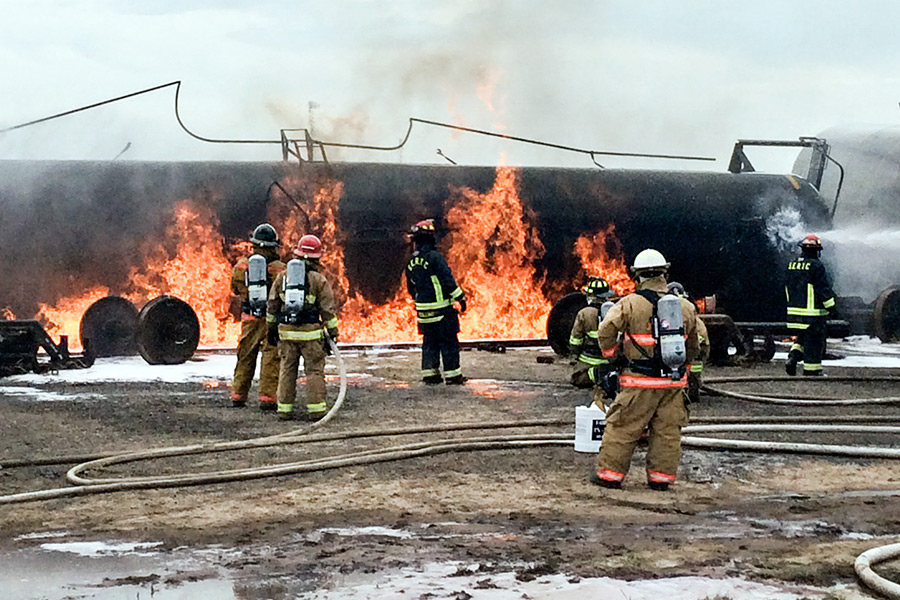As more crude oil rides the rails, firefighters from Northwest Montana and around the country are preparing for the worst-case scenario – an oil train wreck.
Firefighters from Whitefish and Libby recently traveled to Colorado for a three-day training session on how to fight a crude oil fire or respond to a hazardous materials spill. The training sessions included classes where firefighters learned about the different types of hazardous materials and train cars and included field exercises where they fought simulated oil train fires.
The movement of oil by rail gained national headlines in 2013 following a series of explosive train wrecks, including one in Quebec that killed 47 people. According to information released by BNSF Railway and the state of Montana, more than a dozen oil trains travel through Flathead, Glacier and Lincoln counties every week. Much of the crude oil is coming from the Bakken region of eastern Montana and North Dakota, which has seen a rapid increase in oil production in recent years. In 2008, Class 1 railroads, which include the largest rail companies in America, moved just 9,500 carloads of crude oil. Five years later they moved more than 400,000 carloads of crude.
Earlier this year, the nation’s largest railroads agreed to spend $5 million in 2014 to develop a specialized oil-by-rail training program for first responders. Since then, nearly 1,500 firefighters from around the country have traveled to Pueblo, Colorado for training classes at the Transportation Technology Center, Inc. Of the nearly 1,500 firefighters sent to Colorado, almost half of them have come from communities along BNSF Railway’s 32,000-mile system, according to railroad spokesperson Matt Jones. The railroad pays for tuition and travel expenses and 20 firefighters from Montana have attended the classes this year. Jones said the railroad also has specialized training tank cars that travel across the rail system and this year it has been used to train more than 400 firefighters in Montana.
The Transportation Technology Center course provides first responders with information on how to respond to different types of wrecks and spills. According to Libby Volunteer Fire Department Assistant Chief Steve Lauer, one of two Libby first responders who attended the training this summer, they practiced various techniques, including how to cool down tank cars to prevent them from exploding and how to use firefighting foam to fight a blaze.
Whitefish Interim Chief Joe Page said his department has sent six firefighters to Colorado for the training and at least one them is always on duty so someone with the specialized training would be there to help coordinate a response if there ever was an oil train accident,. Page said the training his firefighters received is applicable to other hazardous material spills.
“I think we have the knowledge now that we’ll be able to properly respond to one of these derailments,” Page said.
The railroad industry has also developed a special online training course and Page said all of the department’s firefighters would be required to take the four-hour course.
The Whitefish Fire Department recently held a tabletop exercise with BNSF officials on how it would respond to a wreck in or around Whitefish. The department also worked with a railroad contractor earlier this year on how to use firefighting equipment and foam that has been stationed in the Whitefish yard in case of a wreck.
However, some local officials are saying the railroad still needs to do more. Recently at a meeting of the Flathead Basin Commission, board chair and former Glacier National Park superintendent Chas Cartwright urged BNSF to prepare for a wreck along the park’s southern boundary. Cartwright said the railroad should organize those efforts with local agencies using the Great Northern Environmental Stewardship Area. GNESA was created in 1991 to prepare a Habitat Conservation Plan to protect grizzly bears that were attracted to the tracks by grain spilled from passing trains.
“It’s going to take a lot of coordination to pull this together… If something happened right now we would be in a world of trouble,” Cartwright said, adding that a spill in the Middle Fork canyon could have major impacts on the park and Flathead Lake. “This is our issue, not just BNSF. We are the people who live here.”
